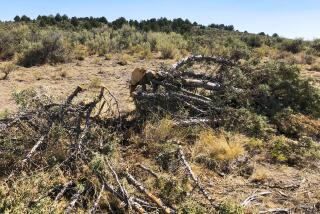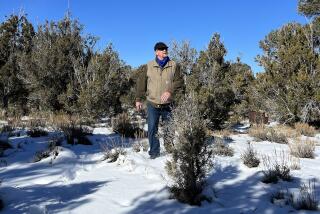Mike Roselle and ‘Tree Spiker’
Mike Roselle is in his element -- fighting a controversial coal industry practice called mountaintop removal mining in the town of Rock Creek, W. Va. “I had to bail some people out of jail,” the 55-year-old rumbles happily by phone from the office of Climate Ground Zero. “We’ve been unleashing hippie hell on them.”
By “them,” he means Massey Energy, the coal megalith that controls huge swaths of West Virginia and employs a fair percentage of its residents. Roselle is a stranger there, but after seven months he finds himself in familiar territory.
A specialist in direct-action environmentalism, Roselle turned up last February, a big, smiling man in western wear, and started putting bodies in Massey’s way.
After 105 arrests this summer, the Appalachian campaign, which has been going on for decades and has support from NASA climate expert Dr. James Hansen and writer Wendell Berry, has taken on new urgency.
The direct confrontation has also brought anger to a head; 2003 Goldman environmental prize winner Judy Bonds was assaulted by a Massey supporter at a rally earlier this summer. West Virginia is the “most treacherous place I’ve ever worked,” Roselle says, which is saying something, given his history.
A way of life
Audacious activism is the point of Roselle’s “Tree Spiker: From Earth First! to Lowbagging: My Struggles in Radical Environmental Action,” which he co-wrote with Josh Mahan. The book is a litany of his exploits: sitting on top of underground nuclear tests with Greenpeace; co-founding Earth First! to block roads made by oil and timber companies in the West; co-founding the Ruckus Society to occupy old-growth forests; co-founding Rainforest Action Network to halt ships exporting Amazonian hardwoods.
For Roselle, 30 years of wins prove that nonviolent resistance can work for environmentalists. This can set the stage for angry reprisals from those who stand to lose jobs or what they see as a way of life.
It has earned Roselle his share of enemies. It also has earned him grudging respect from his most vocal opponents.
“I don’t like his politics. I disagree with just about everything he believes,” says Ron Arnold, executive vice president of conservative policy foundation for the Center for the Defense of Free Enterprise and contributor to the anti-environmentalist bible, “The Wise Use Agenda.” “But he’s a worthy opponent. I admire him for his integrity, his persistence, his intelligence, for his daring. He’s like Jesse James for the adulation he receives for breaking the law.”
“Tree Spiker” is sure to annoy more than just Roselle’s opponents. He’s not shy about condemning the rest of the eco movement for not showing up on the front lines.
“Al Gore has called for young people to sit in front of the bulldozers at the site of new coal-fired plants, yet he will neither join them nor send them any of the hundreds of millions of dollars he has raised,” Roselle writes. “Without full support for a campaign of civil disobedience from the major environmental groups, there is little hope that the current feeble efforts to prevent even more climate change will have any chance of success.”
Rob Perks, campaign director for the Natural Resources Defense Council, has been fighting mountaintop removal in the Appalachians since 2002 and disagrees with Roselle’s analysis.
Still, he says, “Going back to John Muir and the Monkey Wrench Gang, there’s always been a place for people like Mike to jump up in the trees and holler. God bless him, and if there are people down there who exercise their rights as Americans to express their opinion, that’s a great thing. It’s going to help make change happen.”
Yippie childhood
Roselle’s impatience with the legislative option has to do with the fact that each of the campaigns he has undertaken set out to stop a practice already illegal under existing law. He doesn’t dwell much on the main reason more people don’t engage in his brand of activism: Every campaign decays into a legal tangle of arrests and lawsuits, fines and jail time, personal expenses and injuries. The lifestyle doesn’t seem sustainable.
“Sure it is, and I’ll tell you why,” rebuts Robert Amon, a former insurance executive who worked with Roselle on a decade-long fight to save a huge tract of roadless wilderness in Idaho, “and this is the best-kept secret in the direct-action business: It’s really fun!”
That’s probably why Roselle doesn’t seem to mind when West Virginians drive by his office at night and hurl insults, fireworks and paintballs. He seems born to it.
In “Tree Spiker,” he describes his chaotic childhood in L.A. and Kentucky. He worked with his father, an itinerant house painter; joined the Yippies in time to throw Abbie Hoffman in the pool at the 1972 Democratic Convention; and worked as an oil field roughneck in Wyoming -- even while forming Earth First! to resist oil field expansion with a group of conservationists who called themselves the Buckaroos.
Different breed
“We came out of the Western public lands conservation movement, so naturally we would have a Western public lands personality,” Roselle says. “We had more in common with the loggers and ranchers than we did with the Sierra Club people who had come out from San Francisco or Washington.”
Hence his politics -- he doesn’t care who’s in office, as long as they respect the environment -- and his diet; he calls himself an “opportunivore,” meaning he’ll eat whatever is available.
He’s tried to take office jobs, squeezing into Greenpeace and Ralph Nader’s organization, but it never lasts. Today’s atmosphere is hostile to the Buckaroos. They’re too hard-drinking, too intolerant of administrative process. Too fun.
“A historical perspective is frequently kind to the reputation of radicals,” writes Dr. Roderick Nash, author of the seminal work “Wilderness and the American Mind,” in the introduction to “Tree Spiker.” “The men who dumped a million dollars’ worth of tea into the Boston Harbor on the night of December 16, 1773, were reviled as hooligans.”
Roselle’s book, then, and the new campaign, are attempts to inspire a new generation of direct-action resistance fighters. He says that many of the leaders in the environmental movement cut their teeth on direct-action campaigns and anyone who gets a taste will be changed for life.
“My phone never rings unless an environmental group is desperate,” he laughs. “By that time, they are no longer worried about being called extremists. The group will do anything, short of violence, to save whichever remnant of nature they have been fighting for. It is this very desperation that makes them powerful.”
More to Read
The biggest entertainment stories
Get our big stories about Hollywood, film, television, music, arts, culture and more right in your inbox as soon as they publish.
You may occasionally receive promotional content from the Los Angeles Times.






